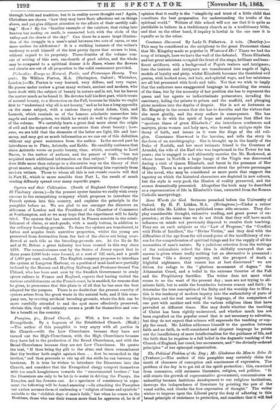Some Words for God. Sermons preached before the. University of
Oxford. By H. P. Liddon, M.A. (Rivingtons.)—Under a rather affected title Mr. Liddon has published some able sermons. They dis- play considerable thought, extensive reading, and great power of ex- pression; at the same time we do not think that they will have much influence on minds not previously disposed to receive their teaching_ They are on such subjects as the "Law of Progress," the "Conflict with Pride of Intellect," the " Divine Victim," and they deal with the difficulties of the age from the old stand-point of the insufficiency of rea- son for the comprehension of spiritual things and for the supply of all the necessities of man's nature. By a judicious selection from the writings of the rationalistic school the idea is skilfully conveyed that an answer is given where really nothing but an alternative is presented : and from "life a dreary mystery, and the prospect of death a frightful nightmare, that reason has at best discovered" we are driven for refuge to the " glorious monument of dogma " the Athanasian Creed, and a belief in the extreme theories of the Fall and the Propitiatory Sacrifice. The writer does not meet what seems to us the want of the present day ; men are not frying to eli- minate faith, but to settle the boundaries between reason and faith ; to determine the true conception of the Deity and the worship due to Him ; this is the tendency of modern inquiry into the authenticity of parts of Scripture, and the real meaning of its language, of the comparison of one part with another and with the various religions ideas that have prevailed at different times. Men may doubt whether the teaching of Christ has been rightly understood, and whether much has not been engrafted on the popular creed that is not necessary to salvation, but they do not expect that science will supersede the teaching or sup- ply the creed. Mr. Liddon addresses himself to the question between faith and no faith, in well-considered and eloquent language he points out the insufficiency of mere intellectualism for the guidance of life, and the faith that he requires is a full belief in the dogmatic teaching of the Church of England, her creed, her sacraments, and" the divinely-ordered principles " of her episcopal organization.






























 Previous page
Previous page